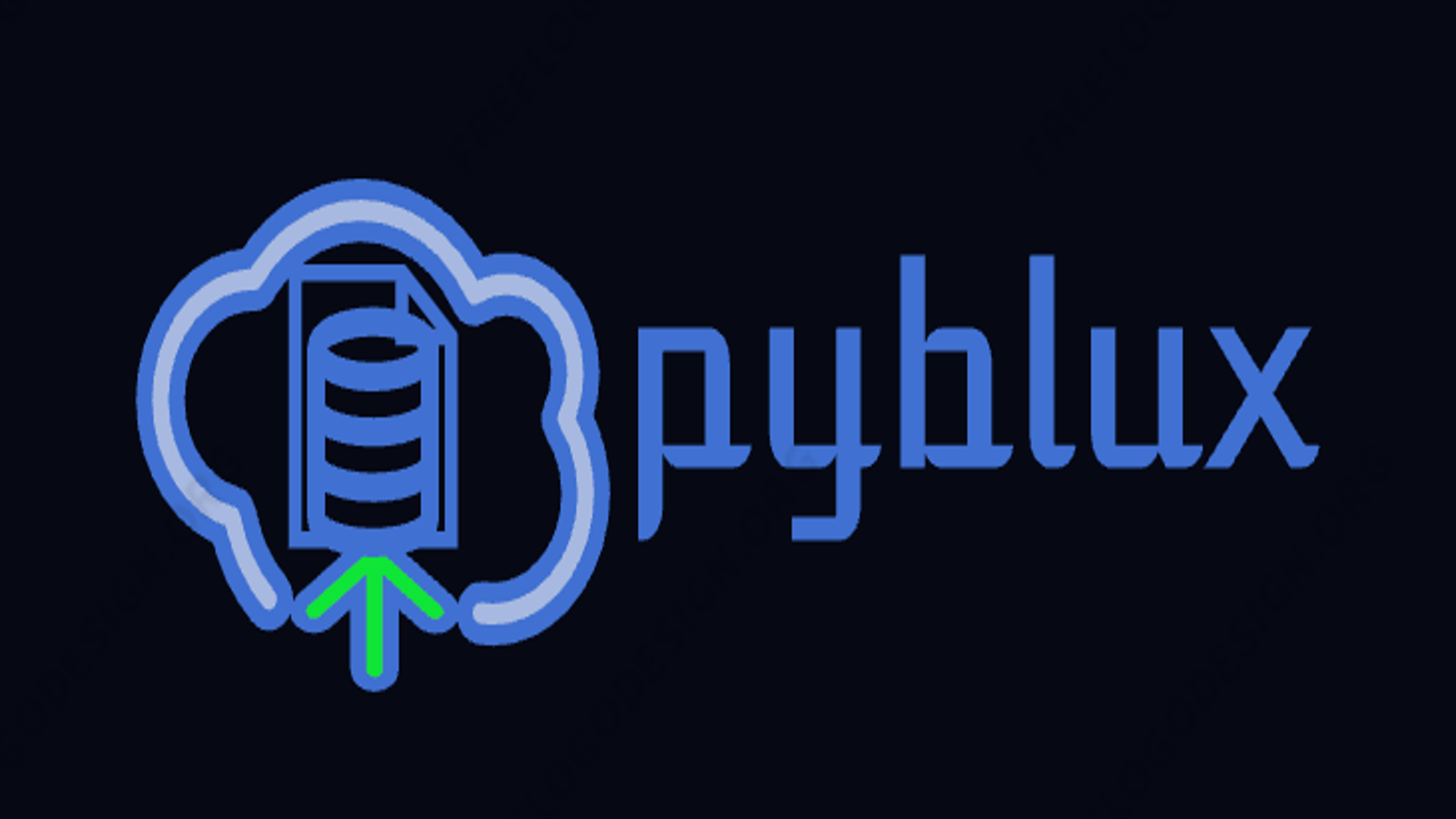A Powerful suite of fast and intuitive Python ETL utilities
Project description

pyblux: A suite of fast, easy-to-use, and intuitive Python ETL utilities.
What is it?
pyblux is a Python package that provides a suite of ETL utilities built to make the interactions with databases in the cloud as well as on-premise fast, easy and intuitive.
Features
- Support multiple databases, including Postgres, MySql, MS SQL, SQLIte, Teradata and Oracle.
- The
get_enginemethod makes it easy to connect to databases in a simple and intuitive manner. Blux.sqlmethod from theBluxclass helps run fast queries. It Povides output results as namedtuple or dictionary and it supports parameterised queries and in-flight transformation of data.Loggerclass helps setup logging via log file or console.send_teams_notificationmethod provides an easy way to send alerts to a MS Teams channel via an incoming webhook.send_emailmethod helps to send email with HTML content- Helpful error messages display the failed query SQL
- DBAPI2 specification was used in order to simplify coding for queries on relational database systems using Python.
Where to get it
The source code is currently hosted on GitHub at: https://github.com/bertin.nono/pyblux
Binary installers for the latest released version are available at the Python Package Index (PyPI)
# or PyPI
pip install pyblux
pyblux provides support for the databases below:
Dependencies
Depending on the use case, the database package should be installed.
- Teradata : Install the Teradata SQL Driver Dialect for SQLAlchemy
pip install teradatasqlalchemy
- PostgreSQL: Install Psycopg which is the most popular PostgreSQL database adapter for the Python programming language.
pip install psycopg2-binary
- MySQL and MariaDB: Install the Pure Python MySQL Driver
pip install PyMySQL
- [SQLite]: No install required
- Oracle: Intall cx_Oracle which is a Python extension module that enables access to Oracle Database.
pip install cx-Oracle
- Microsoft SQL Server: Install the pyodbc which is an open source Python module that makes accessing ODBC databases simple.
pip install pyodbc
Documentation
Classes
-
Blux:
Establishes a connection engine to a database system referenced by the dialect attribute run fast queries.
Note: The dialect is the system SQLAlchemy uses to communicate with various types of DBAPI implementations and databases.
class Blux:
"""
This class connects to a local database session using the db `dialect` library.
"""
def __init__(self, engine=None,dialect=None):
"""
Args:
engine (str): Database connection engine.
dialect (str): database system name(postgres, oracle, teradata,...)
Note: Database Connection package must be installed in order to use this backend.
"""
self.engine = engine
self._dialect = dialect
self.__errlimit = 1
self.__warnings = []
self.__errors = []
self.__logons = []
Example:
table_list = """SELECT table_schema, table_name FROM information_schema.tables"""
postgres_engine = get_engine(dialect='PG', host="localhost", port=5432, database="mydata", user="postgres_user", password="123")
blux= Blux(engine=postgres_engine, dialect='postgres')
dataframe = blux.sql(query=table_list)
table = 'test'
database = 'postgres'
#load dataframe to table
blux.sql(dataframe=dataframe,database=database,table=table, dialect='postgres')
-
Logger:
provides a custom logging handler called logger. Helps Debug SQL and monitor progress with logging.
class Logger:
"""
This class connects to a local database session using the db `connnection` library.
"""
def __init__(self, logname:str, filename:str, level=logging.INFO, console:bool=True):
"""
Args:
logname (str): Logger Name.
filename (str): log file path
level (str): Logger Level (DEBUG, INFO, WARNING, ERROR)
console (cool): print to console
"""
self._logname = logname
self._filename = filename
self._level = level
self._console = console
Example:
import logging
from pyblux import logger
pyblux_logger = Logger(logname=ETL.NAME, filename=log_file,level=logging.INFO, console=True)
logger=pyblux_logger.logger( verbose=True)
Output from a call for get_engine will look like:
2021-07-07 15:06:22,411 get_engine:
2021-07-07 15:06:22,413 get_engine:
2021-07-07 15:06:22,416 get_engine:
Methods:
-
get_engine:
Creates a database connection engine.
get_engine(user:str,password:str,host:str,port:int,database:str,dialect:str,verbose:bool=False,parameter:str=None,raw_engine:bool=True,logger:Callable=print)
Database connection details are defined by get_engine objects (see below).
Example:
import pandas
from pyblux.utils import get_engine
from pyblux.blux import Blux
oracle_engine = get_engine(dialect='oracle', host="localhost", port=1521,database="mydata", user="oracle_user", password="123")
teradata_engine = get_engine(dialect='mssql', host="localhost", port=5432, database="mydata", user="postgres_user", password="123")
postgres_engine = get_engine(dialect='mysql', host="localhost", port=5432, database="mydata", user="postgres_user", password="123")
postgres_engine = get_engine(dialect='teradata', host="localhost", port=5432, database="mydata", user="postgres_user", password="123")
postgres_engine = get_engine(dialect='postgres', host="localhost", port=5432, database="mydata", user="postgres_user", password="123")
Passwords
It is best practice for Database passwords to be stored in environment variables. This can be done on the command line via:
export password=secret-passwordon Linuxset password=secret-passwordon Windows
Or in a Python terminal via:
import os
os.environ['password'] = 'secret-password'
No password is required for SQLite databases.
When URL that includes the password containsPassword conatains special characters
Example: Connection_String = postgresql+psycopg2://user:p@ssword%to%encode@hosturl/defaultdb The above password encoded using urllib.parse:
pwd=urllib.parse.quote_plus("p@ssword%to%encode")
print(pwd)
Connection_String = postgresql+psycopg2://user:urllib.parse.quote_plus("p@ssword%to%encode")@hosturl/defaultdb
-
get_connection:
Gets a regular database connection.
get_connection(user:str,password:str,host:str,port:int,database:str,dialect:str,verbose:bool=False,parameter:str=None,logger:Callable=print):
"""
Get a regular connection for Teradata , Oracle, Aurora/Postgres, Aurora/MySql/MariaDB, SQLite, and Microsoft SQL Server
Returns
-------
Connection Object
"""
Example:
from pyblux.utils import get_connection
oracle_conn = get_connection(dialect='oracle', host="localhost", port=1521,database="mydata", user="oracle_user", password="123")
teradata_conn = get_connection(dialect='mssql', host="localhost", port=5432, database="mydata", user="postgres_user", password="123")
postgres_conn = get_connection(dialect='mysql', host="localhost", port=5432, database="mydata", user="postgres_user", password="123")
postgres_conn = get_connection(dialect='teradata', host="localhost", port=5432, database="mydata", user="postgres_user", password="123")
postgres_conn = get_connection(dialect='postgres', host="localhost", port=5432, database="mydata", user="postgres_user", password="123")
-
create_table_from_dataframe:
Creates table from a dataframe attributes and fastload data into in it.
create_table_from_dataframe(dataframe:pd.DataFrame=None,table:str=None,Blux:Blux=None,verbose:bool=False,logger:Callable=print)
-
is_exist:
Checks is a table or view exist.
is_exist(table:str='', Blux:Blux=None,verbose:bool=False,logger:Callable=print)
-
drop_table:
Checks is a table or view exist and then drops it if it exists.
drop_table(table:str=None,Blux:Blux=None,verbose:bool=False,logger:Callable=print)
-
send_teams_notifications:
Send a Card to a MS Teams Channel
send_teams_notification ( hookurl: str, title: str='' , text: str='', message: str ='', status: str ='', error_message: str='', activitySubtitle: str='', activityText: str='')
-
send_email:
Send an HTML formated email that can include a dataframe
send_email(server:str, port:int,sender: str, receivers: list, subject: str, body_text: str, attachment: any = None,df: pd.DataFrame = None)
Maintainers:
- Bertin Nono
Development status
Stable
Licence
MIT
References
Change Log
(09/12/2021)
- Initial Release
Project details
Download files
Download the file for your platform. If you're not sure which to choose, learn more about installing packages.













